The Night of the Hunter
 Picture The Cabinet of Dr. Caligari meets Psycho, via Nosferatu, The Most Dangerous Game and Citizen Kane, and what do you get? Charles Laughton’s 1955 masterpiece The Night of the Hunter, his one and only film in the director’s chair. A beloved, virtuoso character actor of stage and screen with a legendary body of work already behind him, Laughton had done some well-received work in the British theatre alongside producer Paul Gregory. This success paved the way for the surrealist, German expressionist excesses of this eerily beautiful, dreamlike film. Despite being based on a popular novel and receiving some good critical notices, the film was reviled by the public on its original release as too weird, too peculiar for ordinary tastes. The film bombed at the box office and poor Laughton never completely recovered from the emotional blow. Fifty-two years on, The Night of the Hunter is finally getting its due as an ominous, brooding exercise in film noir.
Picture The Cabinet of Dr. Caligari meets Psycho, via Nosferatu, The Most Dangerous Game and Citizen Kane, and what do you get? Charles Laughton’s 1955 masterpiece The Night of the Hunter, his one and only film in the director’s chair. A beloved, virtuoso character actor of stage and screen with a legendary body of work already behind him, Laughton had done some well-received work in the British theatre alongside producer Paul Gregory. This success paved the way for the surrealist, German expressionist excesses of this eerily beautiful, dreamlike film. Despite being based on a popular novel and receiving some good critical notices, the film was reviled by the public on its original release as too weird, too peculiar for ordinary tastes. The film bombed at the box office and poor Laughton never completely recovered from the emotional blow. Fifty-two years on, The Night of the Hunter is finally getting its due as an ominous, brooding exercise in film noir. Robert Mitchum is the most distinguished of screen psychopaths in the part of preacher-cum-bluebeard Harry Powell. At the audition, Charles Laughton was elated when the actor replied to his summary of the character as “a diabolical shit” by saying “present!” Despite a very bleak and worldly-wise view of acting as utterly pretentious and completely useless (not a bad line of thought), he leaves a supremely powerful mark in the role, combining a lustrous, baleful stare, disarming Southern accent and bouts of manic intensity to chilling effect. The character ranked a worthy #29 on AFI’s 100 Years of Greatest Heroes and Villains, and earned Mitchum another iconic madman's role in Cape Fear seven years on... as well as another slot on the AFI list.
Robert Mitchum is the most distinguished of screen psychopaths in the part of preacher-cum-bluebeard Harry Powell. At the audition, Charles Laughton was elated when the actor replied to his summary of the character as “a diabolical shit” by saying “present!” Despite a very bleak and worldly-wise view of acting as utterly pretentious and completely useless (not a bad line of thought), he leaves a supremely powerful mark in the role, combining a lustrous, baleful stare, disarming Southern accent and bouts of manic intensity to chilling effect. The character ranked a worthy #29 on AFI’s 100 Years of Greatest Heroes and Villains, and earned Mitchum another iconic madman's role in Cape Fear seven years on... as well as another slot on the AFI list.
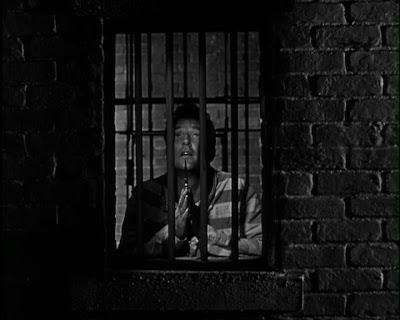 A life watching old horror films warns you to beware of the child actor, and, if necessary, avoid it like the plague (case in point: Donnie Dunagan in Son of Frankenstein, instantly proving himself ten times more terrible than the Monster and Ygor combined… by simply saying “hello”). That said, the kids playing Pearl and John in this film aren’t all that bad: naturalistic, believable for the most part, even rather sweet. Charles Laughton certainly didn’t think so though. He detested them, despite telling Maureen O'Hara on The Hunchback of Notre Dame's set that his deepest regret was not having children - something wife Elsa Lanchester (the Bride of Frankenstein herself) forbade upon discovering his homosexuality. Laughton wisely delegated the directorial chores on the majority of their scenes to their stalker, Robert Mitchum.
A life watching old horror films warns you to beware of the child actor, and, if necessary, avoid it like the plague (case in point: Donnie Dunagan in Son of Frankenstein, instantly proving himself ten times more terrible than the Monster and Ygor combined… by simply saying “hello”). That said, the kids playing Pearl and John in this film aren’t all that bad: naturalistic, believable for the most part, even rather sweet. Charles Laughton certainly didn’t think so though. He detested them, despite telling Maureen O'Hara on The Hunchback of Notre Dame's set that his deepest regret was not having children - something wife Elsa Lanchester (the Bride of Frankenstein herself) forbade upon discovering his homosexuality. Laughton wisely delegated the directorial chores on the majority of their scenes to their stalker, Robert Mitchum. Shelley Winters is the gullible widow gradually more unhinged by the collapse of her life. When she marries Powell, the repressed Preacher refuses to consummate the marriage (he prefers using his knife to dispatch unwanted sexual energies) in a remarkably daring and frank vignette, especially for 1955.
Shelley Winters is the gullible widow gradually more unhinged by the collapse of her life. When she marries Powell, the repressed Preacher refuses to consummate the marriage (he prefers using his knife to dispatch unwanted sexual energies) in a remarkably daring and frank vignette, especially for 1955. It’s also interesting to see the onslaught of religion in her life drive her insane with faith - an interesting bit of moral commentary, perhaps even more relevant with today’s bloodcurdling abuse of Christian dogma.
It’s also interesting to see the onslaught of religion in her life drive her insane with faith - an interesting bit of moral commentary, perhaps even more relevant with today’s bloodcurdling abuse of Christian dogma.
 She’s evolved into an iconic figure approximating the Virgin Mary by the time of her climactic stabbing, pale as a ghost in bed as the light from the window draws an elegant white coffin around her.
She’s evolved into an iconic figure approximating the Virgin Mary by the time of her climactic stabbing, pale as a ghost in bed as the light from the window draws an elegant white coffin around her.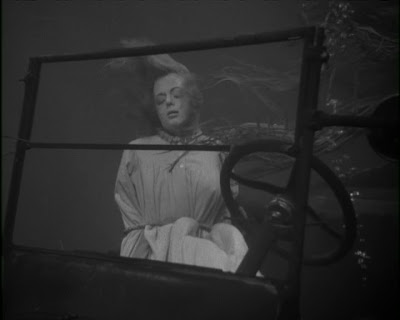 Lillian Gish features in a supremely odd star cameo as the deeply religious saviour of the children, one of those tough, matronly old birds so beloved by American filmmakers. It’s odd because she doesn’t appear (narrative-wise, at least) until we’re over two-thirds into the picture’s runtime. It’s this sort of blistering decision on the part of the screenwriter that adds that palpable extra aura of realism and believability to what might simply be a showy diva’s role (thank goodness they didn't get Bette Davis). It’s a touching, beautiful bit of acting, and she makes for a powerful contrast to the warped spiritual outlook of the rest of the cast.
Lillian Gish features in a supremely odd star cameo as the deeply religious saviour of the children, one of those tough, matronly old birds so beloved by American filmmakers. It’s odd because she doesn’t appear (narrative-wise, at least) until we’re over two-thirds into the picture’s runtime. It’s this sort of blistering decision on the part of the screenwriter that adds that palpable extra aura of realism and believability to what might simply be a showy diva’s role (thank goodness they didn't get Bette Davis). It’s a touching, beautiful bit of acting, and she makes for a powerful contrast to the warped spiritual outlook of the rest of the cast.
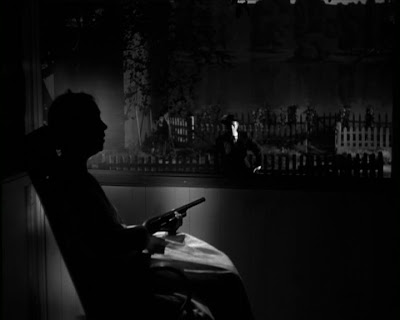 Why is the horror genre so obsessed with cellars? The darkness, the gloom? The austere absence of human life? Their bilious Freudian connotations, so lovingly deployed by Roger Corman in House of Usher? At any rate, they provide a hiding place for Count Dracula, a lair for the Phantom of the Opera, and a secret laboratory for Dr. Jekyll, the birthplace of Mr. Hyde.
Why is the horror genre so obsessed with cellars? The darkness, the gloom? The austere absence of human life? Their bilious Freudian connotations, so lovingly deployed by Roger Corman in House of Usher? At any rate, they provide a hiding place for Count Dracula, a lair for the Phantom of the Opera, and a secret laboratory for Dr. Jekyll, the birthplace of Mr. Hyde.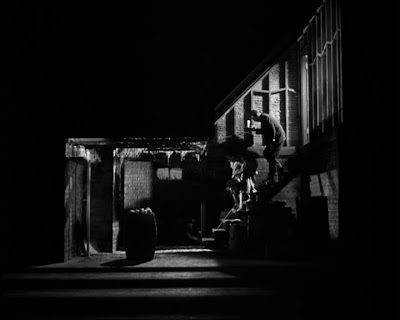



The emotional and dramatic apotheosis of the film comes with an ethereal night-time boat ride. John and Pearl briefly escape the clutches of the cruel adult environment that surrounds them and are swept off into the wider world of nature. Completely staged and setbound in visualisation, the audience is baptised in the phantom shadows of dream logic, as well as layer upon layer of symbolism and hidden meaning. It’s all surprisingly frightening in its abject strangeness and lingering sadness, and any further attempt at description would be in vain.

They had a pretty mom, these pretty flies,
But one day she flew away,
Flew away…
She had two pretty children,
But one night these two pretty children,
Flew away,
Into the sky,



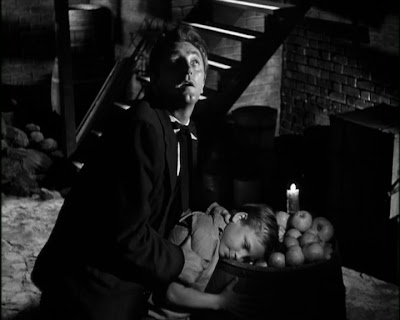


2 Comments:
what a colloquial soliloquy!
Here - a comment, seeing as you are sooooo desperate! Interesting film... can't discuss really, since I've not seen it, but if the child acting is supposedly okay then there should be nothign wrong.
But that spiderweb looks extremely fake. Like they made it out of thick string. I hope the actors did a better job than the people responsible for that cobweb!
Post a Comment
<< Home